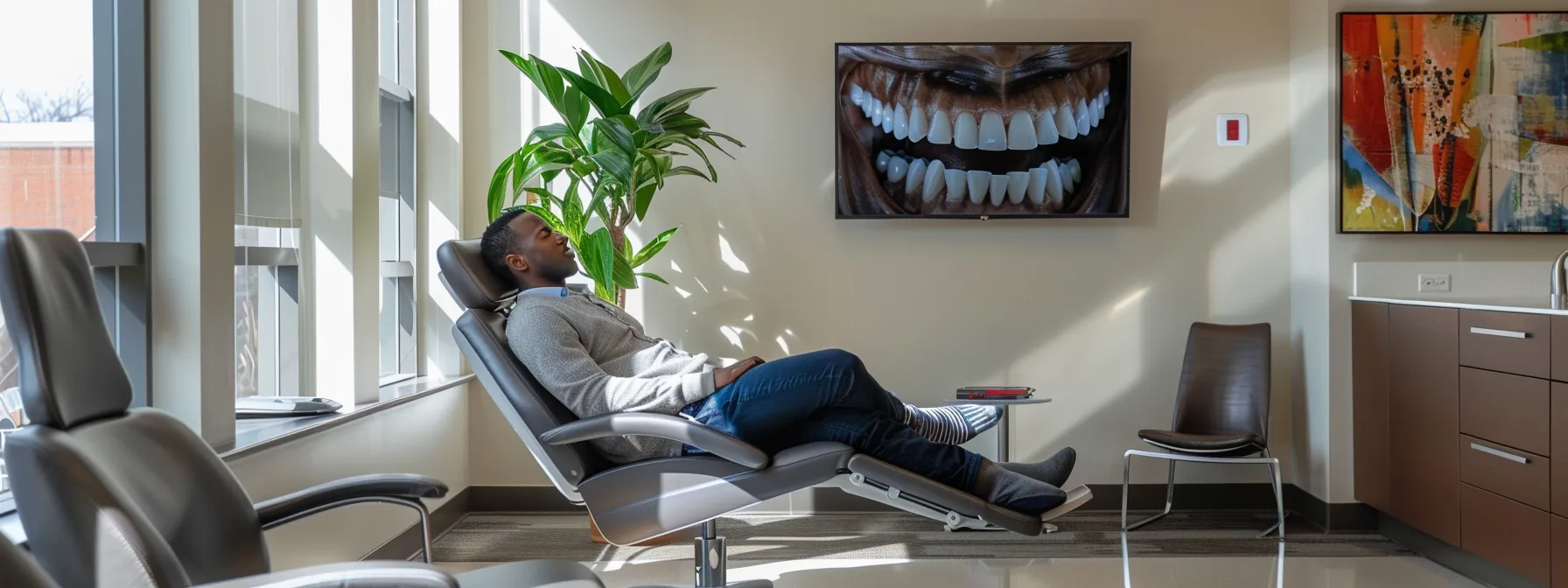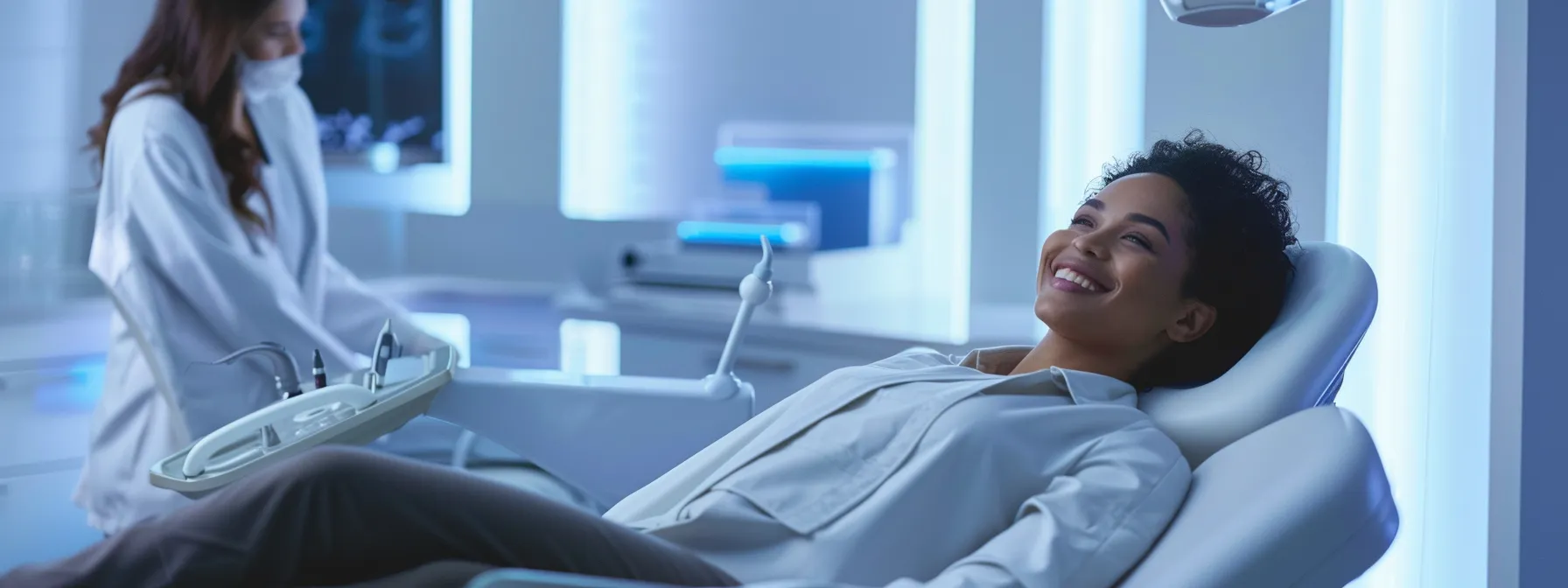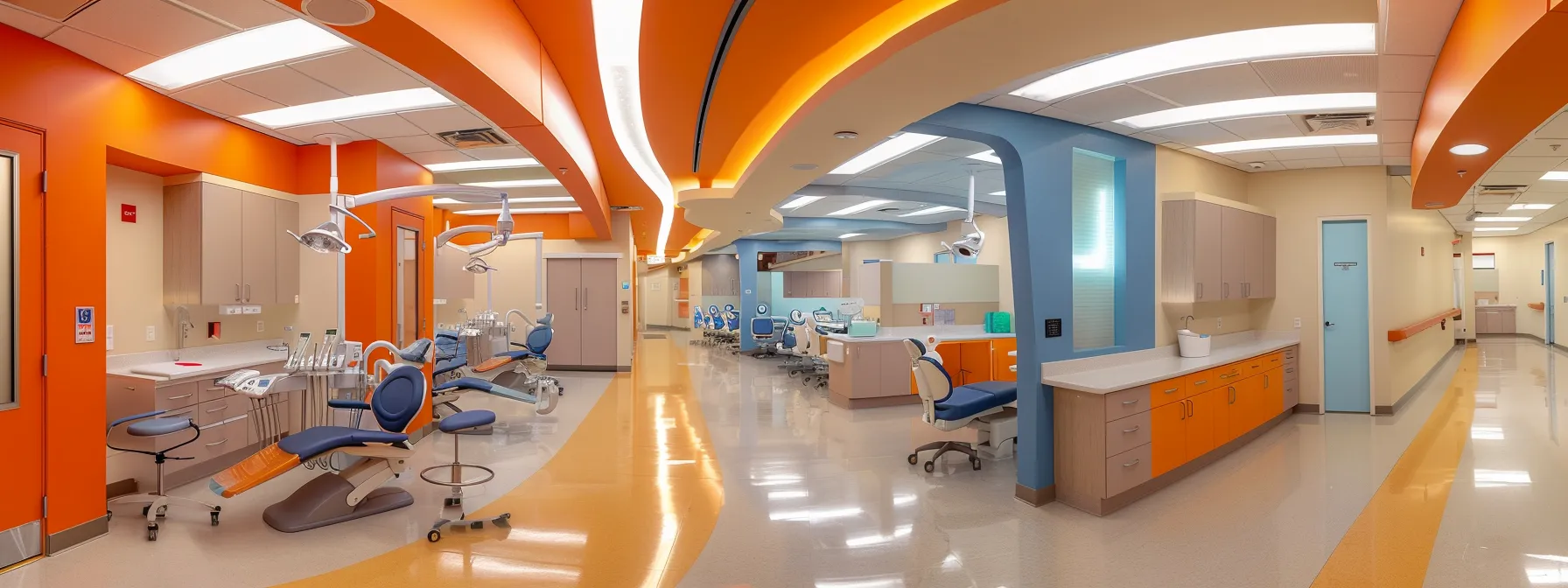Did you know that dental professionals play a crucial role in treating sleep apnea? This article explores the connection between dental care and sleep medicine, focusing on Obstructive Sleep Apnea (OSA). We’ll discuss the types of oral appliances used for treatment, the benefits of dental sleep medicine solutions, and how to start your journey with OSA dental care. By understanding these concepts, readers will learn how dental interventions can improve their sleep quality and overall health.
Key Takeaways
- Dental professionals play a crucial role in identifying and treating obstructive sleep apnea
- Oral appliance therapy offers an effective alternative to CPAP for managing sleep apnea
- Collaboration between dentists and sleep specialists ensures comprehensive care for complex sleep disorders
- Custom-fitted oral appliances are more effective than store-bought options for treating sleep apnea
- Dental sleep medicine solutions can significantly improve sleep quality and overall health for OSA patients
Understanding Obstructive Sleep Apnea and Its Implications
Obstructive Sleep Apnea (OSA) is a serious sleep disorder that affects breathing during sleep. This section explores OSA’s overview, common symptoms, risk factors, and long-term health consequences. Understanding these aspects is crucial for patients seeking care, including those considering board certification in sleep medicine or request appointment with specialists in pulmonology. OSA’s impact on the brain and potential Medicare coverage options are also discussed, expanding your practice.
Overview of Obstructive Sleep Apnea
Obstructive Sleep Apnea (OSA) is a sleep disorder characterized by repeated interruptions in breathing during sleep due to airway blockage. These pauses, often accompanied by snoring, can occur multiple times per hour, disrupting sleep quality and oxygen supply to the body.
Recognizing OSA’s impact, the American Dental Association supports dentists’ involvement in sleep apnea therapy, highlighting the need for specialized skills in this field. Dental professionals with board certification in sleep medicine play a crucial role in identifying and managing OSA, offering patients effective treatment options beyond traditional medical approaches.
Common Symptoms of OSA
Recognizing the common symptoms of OSA is crucial for early detection and treatment. Patients often experience loud snoring, gasping for air during sleep, and daytime fatigue. A physician may conduct a comprehensive exam, including checking blood pressure and assessing jaw structure, to identify potential OSA indicators. While a sleep study remains the gold standard for diagnosis, dentists trained in sleep medicine can play a vital role in initial screening and referral:
Risk Factors Associated With OSA
Several factors contribute to the risk of developing Obstructive Sleep Apnea (OSA), including obesity, age, and family history. Poor sleep habits and certain anatomical features, such as a narrow airway or large tonsils, can also increase susceptibility.
Dental professionals with board certification in sleep medicine are uniquely qualified to identify these risk factors during routine examinations. By incorporating this information into their practice, dentists can play a crucial role in early detection and referral for OSA treatment, potentially involving orthodontics or other dental interventions to improve airway function.
Long-Term Health Consequences of Untreated OSA
Untreated Obstructive Sleep Apnea (OSA) can lead to serious health consequences, significantly impacting a person’s quality of life. The American Academy of dental sleep medicine (AADSM) emphasizes that chronic sleep deprivation from OSA increases the risk of cardiovascular diseases, stroke, and diabetes. Dental professionals with expertise in sleep medicine play a crucial role in identifying and treating OSA, potentially preventing these long-term health risks and improving patients’ overall well-being.
The Importance of Dental Care in Sleep Medicine

Dental care plays a crucial role in managing Obstructive Sleep Apnea (OSA). This section explores how dental professionals contribute to OSA treatment, the benefits of oral appliance therapy, and the advantages of dental solutions for sleep issues.
It also highlights the importance of collaboration between dentists and sleep specialists in providing comprehensive care. Patients seeking to address sleep-related health concerns can request an appointment to learn more about dental sleep medicine options.
Role of Dental Professionals in Managing OSA
Dental professionals play a crucial role in managing Obstructive Sleep Apnea (OSA), expanding their practice beyond traditional dentistry. By pursuing certification in dental sleep medicine, dentists can develop expertise in occlusion and breathing patterns, contributing to patients’ overall health.
This specialized knowledge allows dental professionals to screen for OSA symptoms, recommend appropriate treatments, and collaborate with sleep specialists to provide comprehensive care.
Overview of Oral Appliance Therapy for OSA
Oral appliance therapy offers an effective alternative for managing obstructive sleep apnea (OSA) and addressing sleep deprivation. These custom-fitted devices, prescribed by sleep medicine specialists, work by repositioning the jaw to maintain an open airway during sleep.
Dental clinics specializing in sleep medicine provide comprehensive care, from initial assessment to long-term management of the disease. Studies have shown that patients often have higher adherence rates with oral appliances compared to CPAP machines, making them a valuable option in OSA treatment.
Advantages of Choosing Dental Solutions for Sleep Issues
Dental solutions offer significant advantages for managing sleep issues like obstructive sleep apnea. Dentists with specialized training can create custom mouthguards that reposition the mandible, effectively addressing sleep-related breathing problems.
These devices not only improve sleep quality but can also help manage hypertension, a common concern for OSA patients. By combining their dental degree with expertise in neurology and sleep medicine, dental professionals provide comprehensive care that goes beyond traditional treatments, offering patients a more comfortable and convenient alternative to CPAP therapy.
Collaboration Between Dentists and Sleep Specialists
Collaboration between dentists and sleep specialists is crucial in addressing complex sleep disorders like insomnia and upper airway resistance syndrome. Dental professionals contribute valuable insights into oral anatomy and its impact on breathing, while sleep specialists bring expertise in sleep medicine and research. This teamwork ensures patients receive comprehensive care, combining dental interventions with sleep medicine strategies for optimal outcomes. The collaborative approach often involves:
- Joint consultations to assess patient needs
- Shared treatment planning for upper airway issues
- Coordinated follow-up care to monitor progress
- Cross-referrals for specialized interventions
Types of Oral Appliances for Sleep Apnea Treatment
Oral appliances play a crucial role in treating obstructive sleep apnea, offering patients an alternative to CPAP therapy. This section explores custom-fitted and store-bought options, how these devices work to improve oxygen flow, their effectiveness for different levels of severity, and key factors in selecting the right appliance. The American Academy of Dental Sleep Medicine provides education on these topics to help patients make informed decisions about their treatment.
Custom-Fitted vs. Store-Bought Appliances
In the field of dental sleep medicine, custom-fitted oral appliances offer superior treatment outcomes compared to store-bought options. Dentists specializing in prosthodontics create these personalized devices through a sleep airway transformation process, tailoring them to each patient’s unique oral structure.
This customization ensures better comfort and effectiveness, making them a valuable business investment for dental practices focused on sleep apnea treatment. While over-the-counter appliances may seem convenient, they often lack the precision needed for optimal results, highlighting the importance of professional care and continuous learning in this evolving field.
How Oral Appliances Work to Alleviate OSA
Oral appliances work to alleviate Obstructive Sleep Apnea (OSA) by repositioning the jaw and tongue to maintain an open airway during sleep. These devices, often prescribed by dental sleep medicine specialists, can significantly improve sleep quality and reduce snoring. Proper hygiene is crucial for maintaining the effectiveness of oral appliances, and patients often take a quiz to assess their suitability for this treatment option. The key mechanisms of oral appliances include:
- Advancing the lower jaw forward
- Stabilizing the tongue position
- Increasing muscle tone in the upper airway
- Reducing airway collapsibility
Effectiveness of Different Types of Appliances
Different types of oral appliances show varying levels of effectiveness in treating Obstructive Sleep Apnea (OSA). Mandibular advancement devices (MADs) often prove most effective for mild to moderate cases, repositioning the jaw to maintain an open airway. Tongue retaining devices (TRDs) can help patients who can’t tolerate MADs, particularly those with dental issues.
Custom-fitted appliances typically outperform over-the-counter options, offering better comfort and adherence rates. Dental sleep medicine specialists consider factors like OSA severity, patient anatomy, and lifestyle when recommending the most suitable appliance for each individual.
Factors to Consider When Selecting an Oral Appliance
Selecting the right oral appliance for sleep apnea treatment involves considering several key factors. Dental sleep medicine specialists assess the patient’s specific needs, including the severity of their OSA, jaw structure, and any existing dental conditions.
They also take into account the patient’s comfort preferences and lifestyle habits. The device’s adjustability, durability, and ease of maintenance play crucial roles in determining its long-term effectiveness. By carefully weighing these factors, dental professionals can recommend the most suitable appliance to ensure optimal treatment outcomes and patient satisfaction.
The Benefits of Dental Sleep Medicine Solutions

Dental sleep medicine solutions offer numerous benefits for individuals with obstructive sleep apnea (OSA). These treatments improve sleep quality and overall health, providing enhanced comfort compared to traditional options.
Patients often experience a reduction in snoring and other symptoms, leading to long-term OSA management. The following sections explore these advantages in detail, highlighting how dental interventions can significantly improve quality of life for those with sleep-related breathing disorders.
Improved Sleep Quality and Overall Health
Dental sleep medicine solutions significantly enhance sleep quality and overall health for individuals with obstructive sleep apnea. By addressing airway issues through custom oral appliances, patients often experience more restful sleep, reduced daytime fatigue, and improved cognitive function.
These benefits extend beyond sleep, potentially lowering the risk of associated health problems such as hypertension and cardiovascular disease, ultimately contributing to a better quality of life.
Enhanced Comfort Compared to Traditional Treatments
Dental sleep medicine solutions offer enhanced comfort compared to traditional treatments like CPAP machines. Oral appliances are smaller, quieter, and more portable, making them easier to use consistently. Patients often find these devices less intrusive and more comfortable to wear throughout the night, leading to better treatment adherence and improved sleep quality.
Reduction in Snoring and Other Symptoms
Dental sleep medicine solutions effectively reduce snoring and other symptoms associated with obstructive sleep apnea. Custom-fitted oral appliances help keep the airway open during sleep, minimizing tissue vibrations that cause snoring.
Patients often report a significant decrease in snoring intensity and frequency, leading to improved sleep quality for both themselves and their partners. These devices also address other OSA symptoms, such as daytime fatigue and morning headaches, by promoting better oxygenation throughout the night.
Long-Term Solutions for OSA Management
Dental sleep medicine offers long-term solutions for managing obstructive sleep apnea. Custom-fitted oral appliances provide an effective alternative to CPAP therapy, allowing patients to maintain consistent treatment over time.
These devices can be adjusted as needed, ensuring ongoing effectiveness as a patient’s condition changes. Regular follow-ups with dental sleep specialists help monitor progress and make necessary modifications, promoting sustainable OSA management and improved quality of life.
How to Get Started With OSA Dental Care
Starting OSA dental care involves finding a qualified provider, understanding the initial consultation process, preparing for the first appointment, and planning for ongoing management. This section guides patients through these steps, ensuring they receive comprehensive care from experienced dental sleep medicine specialists. By following these steps, individuals can effectively address their OSA concerns and improve their overall sleep quality.
Finding a Qualified Dental Sleep Medicine Provider
Finding a qualified dental sleep medicine provider involves researching local dentists with specialized training in sleep disorders. Patients can start by checking the American Academy of Dental Sleep Medicine’s directory for certified professionals in their area.
It’s important to look for dentists who have completed additional education in sleep medicine and have experience treating obstructive sleep apnea with oral appliances. Patients should also consider reading reviews and asking for recommendations from their primary care physician or sleep specialist to ensure they find a provider who can offer comprehensive OSA dental care.
Initial Consultation and Evaluation Process
The initial consultation for OSA dental care involves a comprehensive evaluation of the patient’s oral health and sleep patterns. A dental sleep specialist examines the mouth, jaw, and throat structures, looking for signs that might contribute to sleep apnea.
They also review the patient’s medical history and sleep habits, often using questionnaires to assess the severity of symptoms. This thorough approach helps create a tailored treatment plan that addresses the patient’s specific needs.
Preparing for Your First Appointment
Patients preparing for their first OSA dental care appointment should gather relevant medical records, including any previous sleep studies or diagnoses. They should make a list of current medications and symptoms experienced, noting their frequency and severity.
It’s helpful to bring a sleep partner who can provide additional insights into snoring patterns or breathing issues during sleep. Patients should also prepare questions about treatment options, expected outcomes, and potential lifestyle changes to make the most of their consultation.
Follow-Up Care and Ongoing Management
Follow-up care and ongoing management are essential components of OSA dental care. After initial treatment, patients typically return for regular check-ups to assess the effectiveness of their oral appliance and make any necessary adjustments. These appointments allow dental sleep specialists to monitor progress, address any concerns, and ensure optimal device performance. Patients may also undergo periodic sleep studies to evaluate treatment outcomes and adjust their care plan as needed:
Patient Success Stories in Dental Sleep Medicine

Patient success stories in dental sleep medicine highlight the transformative impact of oral appliances on sleep apnea. This section explores real-life experiences, testimonials, and long-term health improvements. It also discusses ongoing support and resources available to patients, showcasing the effectiveness of dental interventions in managing OSA and improving overall quality of life.
Transformative Experiences With Oral Appliances
Patients often report transformative experiences with oral appliances for sleep apnea treatment. Many individuals find relief from chronic fatigue and daytime sleepiness, enjoying improved energy levels and cognitive function. These custom-fitted devices not only address snoring but also help users achieve more restful sleep, leading to better overall health and quality of life.
Testimonials From Satisfied Patients
Satisfied patients often share compelling testimonials about their experiences with dental sleep medicine solutions. Many report significant improvements in sleep quality, energy levels, and overall well-being after using custom-fitted oral appliances. These personal accounts highlight the effectiveness of dental interventions in managing OSA and emphasize the positive impact on daily life. Common themes in patient testimonials include:
- Reduced snoring and improved relationship with bed partners
- Increased daytime alertness and productivity
- Better mood and mental clarity
- Easier travel due to portable oral appliances
- Enhanced quality of life and overall health
Long-Term Outcomes and Health Improvements
Long-term outcomes for patients using dental sleep medicine solutions show significant health improvements. Many individuals experience reduced blood pressure, improved cardiovascular health, and better glucose control. These positive changes often lead to a decreased risk of heart disease and stroke. Patients report sustained benefits, including enhanced cognitive function and mood stability, years after starting treatment. The long-term success of dental interventions for OSA is evident in the following patient outcomes:
Ongoing Support and Resources for Patients
Dental sleep medicine providers offer ongoing support and resources to ensure patients continue to benefit from their OSA treatment. Many clinics provide regular check-ups, educational materials, and support groups to help patients manage their condition effectively. Online portals and mobile apps often allow patients to track their progress, access personalized advice, and connect with their care team. These resources help maintain treatment adherence and address any concerns promptly, contributing to long-term success in managing sleep apnea.
Conclusion
Dental sleep medicine plays a crucial role in managing Obstructive Sleep Apnea, offering effective alternatives to traditional treatments. Custom-fitted oral appliances provide significant benefits, including improved sleep quality, reduced symptoms, and enhanced overall health. Collaboration between dentists and sleep specialists ensures comprehensive care, addressing both oral health and sleep-related issues.
By seeking qualified dental sleep medicine providers and following through with ongoing management, patients can experience transformative outcomes and long-term health improvements, ultimately leading to a better quality of life.
Here’s how we help:
- Customized Integration Plans: Tailored strategies to fit your practice’s unique needs.
- Staff Training & Education: Empower your team with the skills to succeed.
- Medical Billing Support: Navigate insurance and maximize reimbursements.
- Marketing Assistance: Reach the right patients and grow your sleep practice.
- Ongoing Mentorship: Continuous support as your program expands.
Don’t let uncertainty hold you back. Schedule a consultation today and start building a thriving dental sleep practice with Ohl Consulting!





